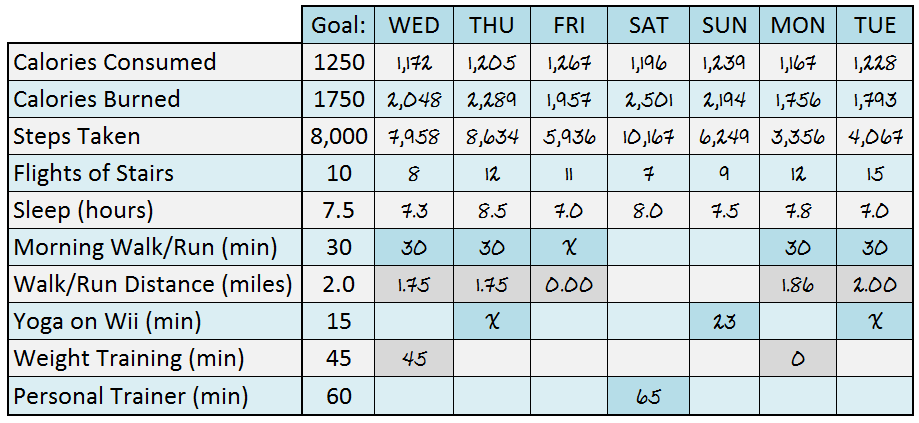It can be difficult to stay on track with your weight loss, exercise and eating healthy plans when you have a big goal. Losing 20 pounds can seem daunting. Try making mini-goals for yourself. Remember to make SMART goals:
S – Specific
M – Measurable
A – Attainable
R – Relevant
T – Time-Bound
You’ve probably seen that before, but it bears repeating.
Health-Related Goals
When deciding on healthy mini-goals for weight loss, consider the factors that help you with that weight loss.
- Calorie Intake – Calculate how many calories you should be eating every day and set a healthy goal. (Women, do NOT go beneath 1200 calories!)
- Food Nutrients – You need a healthy balance of healthy carbs, healthy fats, and healthy proteins to fuel your body.
- Sleep – If you don’t get enough sleep your body won’t function well and you won’t see the pounds drop like you expect.
- Calorie Burn – You need to burn those calories. Your body has a BMR (Basal Metabolic Rate) and will burn calories just breathing and pumping blood through your body. You also burn calories through general daily activity and extra exercise. However, if you want to lose 1 pound a week, you have to burn 500 more calories a day than you eat.
- Distance Traveled – If you are doing your cardio, yo a’re probably traveling measurable miles. You can set ever-increasing goals for yourself.
- Steps – You can use a pedometer and measure how many steps you take in a day.
- Minutes of Exercise – You can exercise for an ever-increasing time if you like.
- Flights of stairs – This is a fun goal to set. Everyone knows it’s better to take the stairs than the elevator. Set an ever-increasing goal for yourself.
- Stress – Being stressed will adversely affect your weight loss. If you have a problem with stress, set a goal to meditate or do some other stress-lowering activity.
Health-Related Rewards
While achieving goals can be its own reward, it is sometimes good to reward yourself in other ways for reaching milestones. Do not reward yourself with food! Do something that reinforces good behavior or helps you reach your main goal. Some good rewards include:
- Massage or Spa treatment – this is great for stress-reduction or easing those hard-working muscles.
- Travel – Meeting your 1-month goal could mean that you can spend the day at a local amusement park (walking around all day and having fun) or take a ski trip (getting a LOT of exercise).
- Cultural Reward – Maybe your reward for improving your mind is improving your soul. Go see a play or go to a concert.
- Mental Reward – You’re improving your body, so improve your mind. Buy a new book.
- New Clothes – Setting a goal for reaching a smaller size could be rewarded with a shopping tip for a set dollar amount.
Example Mini Goals
During a 10-week weight loss competition, you need to keep yourself motivated. So you set goals (and rewards) for each week:
- Do 30 minutes of cardio 4 days a week and do 45 minutes of cardio & weight training 2 days a week.
- During 30 minutes of cardio, get 1.75 miles. Hit 10 flights of stairs every day.
- Burn 2500 calories a day (except rest day) and eat 1500 calories.
Example Full Goals Schedule
Stepping it up a bit, you can set multiple goals for yourself for the week. For example, every day you could track:
- Calories Consumed with a goal of 1250
- Calories burned with a goal of 1750
- Steps Taken with a goal of at least 8,000
- Flights of Stairs climbed with a goal of 10
- Sleep – get at least 7.5 hours
You can also track your exercises by plotting them out weekly.
- M-F Walk/Run 30 min a day with a goal to reach at least 2 miles
- Do yoga on a Wii for 15 min on Sun, Tues, and Thurs
- Do Weight training for 45 minutes on Mon, Wed
- Work out with a trainer for 1 hour on Saturday
Here’s a great way to visualize that:
Stay Focused
Setting mini-goals can help you keep your focus when your long-term goal can take a lot of time.





